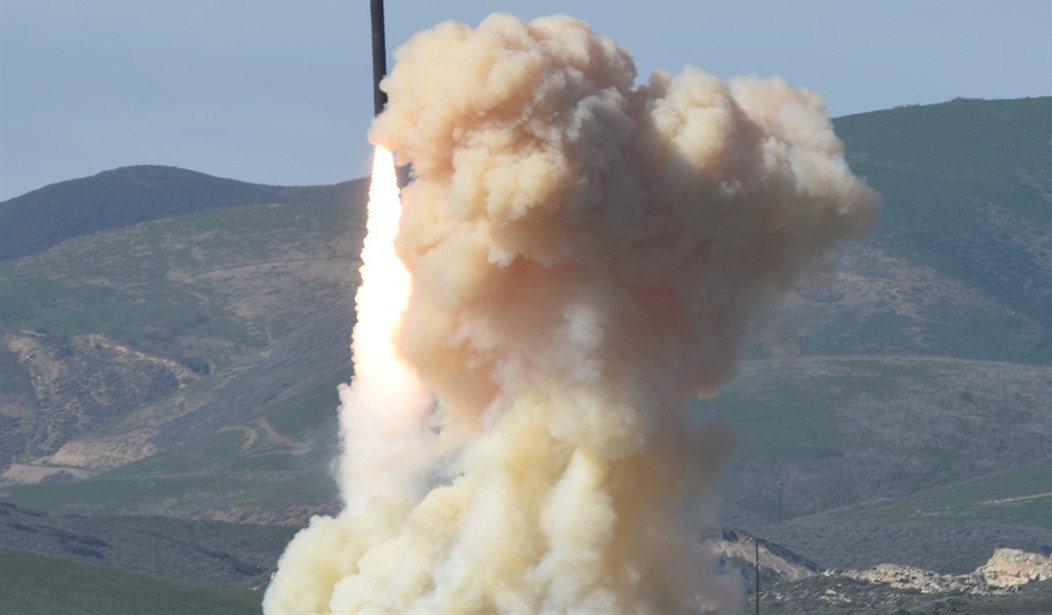The new year will likely bring a new presidential administration in Washington, and that will mean many changes. That’s only fair. It’s one of the many ways politics and policy intersect. I’m sure I’ll oppose a whole lot of what comes out of Washington.
A new administration must be careful not to go too far and throw out things that are working, such as the Abraham Accords. Plenty of things, maybe even most, about the federal government deserve to be changed. But the things that are working deserve to survive a change in power.
Missile defense is one of them. It’s working.
Modern missile defense started with President Ronald Reagan and took form under President George W. Bush, who dared to withdraw from an international treaty to allow development. Since then, the government’s missile defense experts at the Missile Defense Agency (MDA) have been working with private contractors to build a screen that can protect the homeland from attack. President Barack Obama disagreed with most things Bush had done. After another eight years, President Donald Trump took office, himself disagreeing with most things Obama had done.
But all three men agreed on at least one thing: to maintain the public-private partnership that is building the world’s only effective missile defense screen.
We shouldn’t be tinkering with that partnership now. But some people are trying. Bureaucrats inside MDA are a power play to name their organization as the “Systems Integrator” and push out the private contractors who have taken the lead on missile defense programs until now.
To be fair, “This approach offers some potential benefits to the agency, such as more direct control over and greater insight into GMD’s cost, schedule, and performance,” a recent Government Accountability Office review noted. More importantly, though, the report warned about the dangers, and there are many. “However, the approach has some challenges that, if not addressed, could outweigh the benefits.” So the cost-benefit analysis could flip to the negative.
Some of the problems include a lack of knowledge to effectively implement the program. GAO: “The program may encounter challenges obtaining the technical data and staffing levels necessary to manage the technical baseline and integrating the multiple prime contractors, which could ultimately affect GMD’s availability or readiness.” They also cite a lack of skilled staff at the Pentagon to run the program. GAO again: “A review team chartered by MDA to assess the DOSP strategy reported in July 2017 that the size and scale of the GMD weapon system may require staffing levels and expertise that the government did not have at that time.”
There are management difficulties as GAO argues that “limited access to or understanding of historical, contemporary, and future technical data could diminish MDA’s ability to effectively manage the system’s architecture.” Future planning is the fourth roadblock. GAO writes: “MDA officials also told us that there is no model to follow on how best to structure the GMD program or transition away from a prime contractor that has led system integration for over two decades.”
This federal power grab comes at a dangerous time for our country. Our government is struggling to deal with the COVID pandemic and keep the economy on track to return to its pre-pandemic prosperity. We’re very vulnerable, more vulnerable than we have been in decades. A hostile China, Iran, and North Korea are watching and sizing us up.
“A single North Korean nuclear warhead, delivered against a major American city, could kill more people than all the deaths in the nation’s wars since 1776,” military analyst Loren Thompson writes in Forbes. “A handful of nuclear warheads delivered against several cities could collapse the national economy.”
The Ground-based Midcourse Defense (GMD) element of the Ballistic Missile Defense System is a true final line of defense against such a strike. It’s not perfect, no missile defense system is at this point, but it has worked in testing. It can engage and destroy limited intermediate- and long-range ballistic missile threats in space to protect the United States.
However, the program needs to keep moving forward and growing. The best way to achieve success is to maintain the current public-private partnership.
Supposing he prevails, lawmakers should commit to working with President-elect Biden to keep an effective missile defense screen in place. There’s plenty that needs fixing in Washington. There will be plenty of voices pushing and pulling in many directions. Americans are now knocking test missiles out of the sky from ships. What we are doing is working. MDA needs to stay the course.
Bryan Preston is a veteran of the United States Air Force. He is the author of Hubble’s Revelations: The Amazing Time Machine and Its Most Important Discoveries and served as producer for NASA’s flagship Hubble Space Telescope.








Join the conversation as a VIP Member